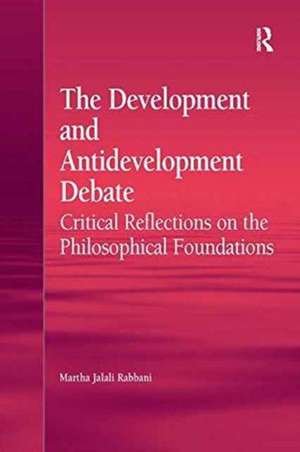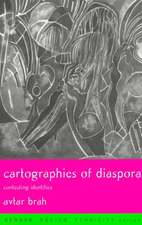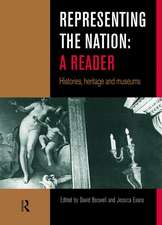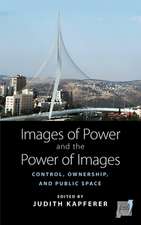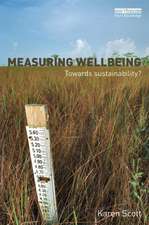The Development and Antidevelopment Debate: Critical Reflections on the Philosophical Foundations
Autor Martha Jalali Rabbanien Limba Engleză Paperback – 23 noi 2016
| Toate formatele și edițiile | Preț | Express |
|---|---|---|
| Paperback (1) | 258.67 lei 3-5 săpt. | +22.67 lei 4-10 zile |
| Taylor & Francis – 23 noi 2016 | 258.67 lei 3-5 săpt. | +22.67 lei 4-10 zile |
| Hardback (1) | 699.79 lei 6-8 săpt. | |
| Taylor & Francis – 7 apr 2011 | 699.79 lei 6-8 săpt. |
Preț: 258.67 lei
Nou
Puncte Express: 388
Preț estimativ în valută:
49.50€ • 51.49$ • 40.87£
49.50€ • 51.49$ • 40.87£
Carte disponibilă
Livrare economică 25 martie-08 aprilie
Livrare express 08-14 martie pentru 32.66 lei
Preluare comenzi: 021 569.72.76
Specificații
ISBN-13: 9781138260931
ISBN-10: 1138260932
Pagini: 196
Dimensiuni: 156 x 234 x 11 mm
Greutate: 0.45 kg
Ediția:1
Editura: Taylor & Francis
Colecția Routledge
Locul publicării:Oxford, United Kingdom
ISBN-10: 1138260932
Pagini: 196
Dimensiuni: 156 x 234 x 11 mm
Greutate: 0.45 kg
Ediția:1
Editura: Taylor & Francis
Colecția Routledge
Locul publicării:Oxford, United Kingdom
Cuprins
Contents: Preface; Part I Grounding the Development Debate: Introduction to part I; The debate and its claims: oppression, value and poverty; The condition beneath the claims: understanding human unity; Beyond dependency: a recognition approach to the development debate. Part II Truth and Power in the Development Debate: Introduction to part II; The truth of development; Overcoming the power of development. Part III Redefining Development: Introduction to part III; The truth and power of dialogue; The community of friends; Development as the collective search for truth; Bibliography; Index.
Notă biografică
Dr Martha Jalali Rabbani, Faculty, Peace and Conflict Studies Program, Department of Humanities and Western Civilization, University of Kansas, USA
Recenzii
'...a unique, profound and daring case for why real development cannot be a unilateral endeavour. The unconventional conclusion that yet may ring so familiar to those who are sincerely engaged in the pursuit of people's well-being is that we all live in an underdeveloped world and that development can only be fostered when all parties are allowed and welcomed to contribute to the well-being of everyone else.' Greg Mortenson, Founder, Central Asia Institute, USA 'The book approaches the subject of development from a perspective that has been almost absent from the development debate: its philosophical foundations and the normative value of its arguments and counter-arguments. It goes beyond the current state of the discussion and presents an all-embracing alternative that confers meaning to development, carried within a spirit of cooperation and inclusiveness. This alternative aims towards the construction of a peaceful world. This is a highly useful book for scholarly discussions and even more so for development agents working in the so called developing countries.' Leonardo Boff, Rio de Janeiro University, Brazil 'It is time for action. Martha Jalali demonstrates that development means all the diverse people - until the limit of unicity - working together, inspired by the universal principles. We have a common destiny, a unique human family and a unique Mother Earth. Each human being is able to create, to invent. That is our hope. But now it is urgent to act. Socially, environmentally and ethically, we cannot be guided anymore by the most powerful and rich. We, the peoples..., as enshrined in the Charter of the United Nations, must resolve not to remain silent. In the dawn of a new century and millennium, the time for a new commencement has arrived.' Federico Mayor, Fundación Cultura de Paz, Spain
Descriere
This book reflects on the philosophical assumptions that sustain the development debate. Rabbani analyzes how the modern project of development and the antidevelopment discourse reduce the human condition to a struggle for self-preservation and, likewise, social and international cooperation to a strategic and self-defeating process. Instructors and graduate and undergraduate students as well as those working in development agencies will find this volume ideally fit for purpose.
